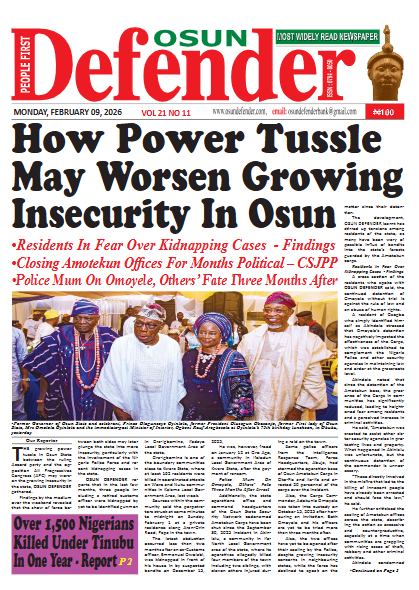ISSUES & POLICY: Security Challenges In The South-West

By Femi Oyedele
FULANI herdsmen are Nigerian cattle herders from the Northern part, whose sole source of income depends on cattle rearing and marketing. They are nomads by nature and wander about looking for forage (pasture) for their cattle. They operate in all the Northern parts of Nigeria, whole of Niger Republic, whole of Chad and Southern part of Sudan. They are always on their toes, ‘following’ their cattle to wherever they can get adequate forage/pasture. Due to the effect of climate change, they are now in high number in the Middle Belt, Southern, Eastern and Western parts of the country looking for a suitable field to feed their herds. This move is supported as their right to free movement by the Nigerian 1999 Constitution.
In their right to free movement, their paths often cross those of farmers in the areas where they migrate to. These farmers depend mainly on the proceeds from their farming and often clash with the Fulani herdsmen to ensure that their farms are not destroyed by the herders. In some cases, like that of the Fulani herdsmen massacre of Benue farmers, the clash led to maiming, killing and arson. It has also being alleged that since the intrusion of the Fulani and Bororo herdsmen into the other parts of Nigeria, it is not only the farmers that are having problems, the residents of the areas where these herders are operating do have security challenges.
But crime has no ethnic coloration and it has not been established that all Fulani herdsmen are criminals and/or that all criminals in the South-West are Fulani herdsmen. Some hotspots for crime in the South-West are Akure to Ilesa Expressway, Owo to Akure Road, Ore to Sagamu Expressway, Ilesa to Ibadan Expressway, Ijebu-Ijesa to Ado Ekiti Road and Oke Ogun area of Oyo State, including Saaki, Igangan and Iseyin, where there are rampant kidnapping of indigenes and residents for ransom. In some cases, people identified these kidnappers to be Fulani/Bororo herdsmen. In the cases of kidnapping at Igangan and Kishi, the Fulani heads were involved in the negotiation of ransom for victims’ release.
In Ondo State, more than fifty public servants in the state and travellers have been kidnapped for ransom ranging from between N5, 000,000 to N10, 000,000. The six cases which are still fresh at heart are the United Nations employee who was kidnapped along the expressway between Ipetu Ijesa junction and Ilesa Brewery junction; the killing of Osun State College of Technology, Esa Oke, lecturer between Esa Oke and Ijebu Ijesa road, the killing of Federal university of Technology, Akure (FUTA) Deputy Registrar, the kidnapping of Chief Olu Falae, the killing of Pa Ayo Fasoranti’s daughter and the kidnapping of Mr. Gbenga Ibikunle and his wife at Uso, along Akure – Owo Expressway who paid handsomely before his release. In some cases, the victims were killed after ransoms have been paid.
It was this insecurity and others challenges in the South-West that led to the establishment of the Western Nigeria Security Network (WNSN), codenamed Amotekun Corps. The paramilitary organization called “Amotekun” is a security outfit established by the six Nigerian western states of Ekiti, Lagos, Ogun, Ondo, Osun and Oyo. The security outfit is in collaboration with Oodu’a People’s Congress (OPC), a pan-Yoruba security group. Operation Amotekun was launched on Thursday, January 9, 2019, by the governors of the South-West states to tackle security challenges of the region, which include highway robbery, killing for rituals, kidnapping and other criminal activities in the region. This establishment and the existing security outfits are yet to proffer solutions to our security challenges in the South-West.
Mary Catherine Bateson, a cultural anthropologist, stated that “solutions to problems often depend on how they are defined”. The security problems of the South-West have not been well captured and defined, hence the nonchalant attitude to resolve them. In light of the insecurity in Ondo State, Mr. Rotimi Akeredolu, the Executive Governor of the state, gave an order to the herdsmen to vacate the Ondo forests where the herdsmen have been living and doing their businesses. The Presidency and other groups loyal to the herdsmen kicked against the Ondo State governor’s directive on vacation of forest reserves by the herdsmen, quoting fundamental human rights as enshrined by the Nigerian 1999 Constitution.
The Supreme Court will decide whether the Presidency has the right to control the forest reserves of a state in Nigeria or not. The court will also decide whether a reserve meant for conservation of forest products and wild animals like elephants, leopards and lions can be possessed by cattle herders. What is the essence of keeping a forest reserve? It is to conserve some species of animals, wild life and plants (flora and fauna) which are in the verge of extinction. These animals and plants are referred to as “endangered species”. There are laws backing the creation of forest reserves like the “Endangered Species Act” etc. It is noteworthy to say that we are losing our ecosystem because of poachers, including herders in our forests.
Elephant’s community is reducing and their only track from Ondo State to Ogun State through Osun state is being threatened by the herders. The herders, who never reported a case of kidnappers, are dwelling in the forest reserves which have evidence of dead bodies of kidnap victims and their belongings. A normal human being does not stay in the wild, so the herders must vacate Ondo forest reserves. A recent forest resources study carried out by Federal Department of Forestry in Nigeria showed that the forest estate of Nigeria has been very highly depleted. It was estimated that only about 974,674 hectares of our forest reserves is productive due to cattle herding activities, bush burning by hunters, illegal logging and charcoal production, construction activities and farming.
Olufemi Adedamola Oyedele.









